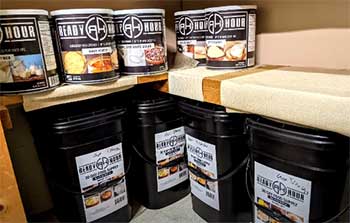When it comes to clearing up emission issues, boosting fuel efficiency, and even passing those all-important smog tests, CRC Emissions System Cleaner stands out. If you’ve struggled with that check engine light haunting your dashboard or are looking for an easy way to reduce emissions, this product could be your answer.
And, let’s face it, no one wants to deal with failing an emissions test. So, if you’re ready to tackle that P0420 code and give your car’s performance a boost, CRC’s emissions system cleaner is worth considering.
My Experience Using CRC Emissions System Cleaner
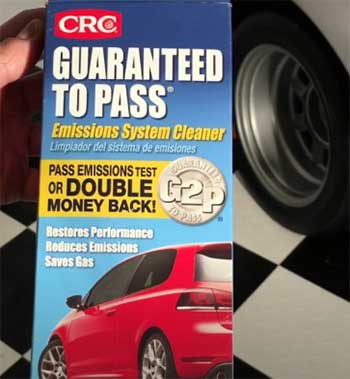
I’ll be honest—when I first picked up CRC Emissions System Cleaner, I was skeptical.
My car had been throwing the dreaded P0420 code, indicating a catalytic converter issue, and I wasn’t eager to spend thousands on a replacement.
After reading reviews and seeing CRC’s “guaranteed to pass” promise, I decided to give it a try.
Following the instructions, I poured the bottle into a full gas tank and set out for a mix of highway and city driving.
My check engine light didn’t turn off immediately, but I could tell something was happening.
By about a quarter of a tank, I saw a small but noticeable improvement in performance; the engine felt smoother and accelerated with less effort. Soon enough, that P0420 code disappeared along with the check engine light. I can’t tell you how much relief I felt seeing that!
Then came the true test: the emissions inspection. I’d failed once before, so I was cautiously optimistic, and to my surprise, the car passed smoothly. The CRC cleaner had lived up to its promise. I noticed slightly better gas mileage, too—not a massive difference, but enough to feel like an added bonus.
A few months later, the check engine light reappeared, reminding me that this cleaner isn’t a permanent fix, but it’s an affordable solution for temporary relief. For anyone dealing with emissions issues or looking to boost performance on an older car, I’d say CRC Emissions System Cleaner is worth a try.
It won’t replace major repairs, but it’s a helpful tool for passing inspections and keeping your car running more efficiently. I now keep a bottle on hand, using it every few months, especially before smog tests.
Pros of CRC Emissions System Cleaner
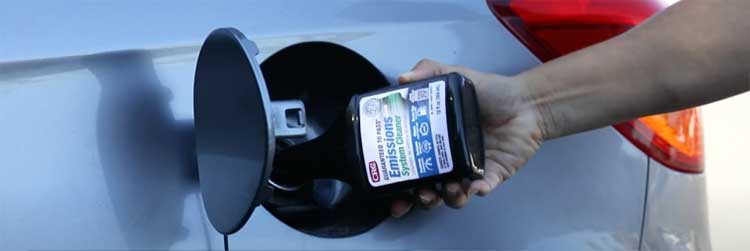
Using CRC’s emissions system cleaner has its perks, especially if you’re after a quick, relatively low-cost way to tackle emissions issues.
- Guaranteed to Pass Emissions Test: For many people, this is the top reason to try it. CRC guarantees it will pass the test, and the company offers a refund if it doesn’t. This is a big advantage for anyone worried about failing smog checks.
- Improves Fuel Economy: CRC claims that one bottle can improve gas mileage by helping clean the fuel system, and many users, including myself, notice a slight efficiency boost.
- Easy Application: No need to be a mechanic. Just pour it into a full tank, drive as instructed, and let it do its work.
- Compatible with Different Engines: Whether you have a gasoline or ethanol-blend engine, direct injection, or turbocharged vehicle, CRC is safe to use. This versatility is a big plus.
- Smoother Engine Performance: Many users, myself included, feel a smoother acceleration and overall engine performance post-treatment.
Cons of CRC Emissions System Cleaner
No product is perfect, and CRC Emissions System Cleaner has a few downsides to consider.
- Not a Permanent Fix: While it can help clear codes like P0420 temporarily, it doesn’t solve the root cause of emissions issues. So, if your car is experiencing serious engine or catalytic converter problems, CRC won’t be a magic bullet.
- Inconsistent Results: Some users find that it doesn’t work on the first try or that they need to use it repeatedly. For best results, you may need to follow specific driving cycles or reapply the product, which can be inconvenient.
- Not Suitable for All Situations: CRC works best for mild to moderate emissions issues. If you’re dealing with a more severe problem, such as a completely clogged catalytic converter, you’ll likely need professional help.
Tips For Maintenance and Getting The Most Out of CRC
If you’re using CRC Emissions System Cleaner or any emissions product, here are some tips to maximize effectiveness and extend your engine’s health:
- Follow Directions Closely: Don’t be tempted to use more than the recommended dose. A single bottle in a full tank is sufficient. Overusing may lead to less effective results.
- Drive the Recommended Distance: For best results, make sure to drive enough to circulate the cleaner fully through your fuel system. Ideally, this means highway and city driving over a couple of hundred miles.
- Repeat as Needed: If you’re dealing with persistent issues, using CRC every few months might help keep things running smoothly, especially if you have an older vehicle.
- Combine with Regular Oil Changes: A cleaner fuel system often leads to better overall engine health. Regular oil changes and filter replacements are also key to keeping emissions in check.
- Address Root Causes: If your car has persistent emission issues or codes, using CRC as a quick fix is fine, but be sure to investigate and address any underlying mechanical issues for a long-term solution.
How Does CRC Compare To Other Emissions Cleaners?
There are plenty of emissions system cleaners on the market, so how does CRC stack up?
- CRC Emissions System Cleaner Vs. Rislone Catalytic Converter Cleaner
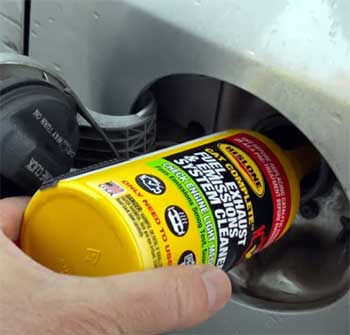
Rislone Catalytic Converter Cleaner is another well-known product in this space, and it’s designed specifically to target catalytic converter issues.
One of Rislone’s selling points is its ability to clear catalytic converter-related codes, like the P0420, by breaking down carbon deposits in the exhaust system, reducing harmful emissions, and optimizing performance.
Rislone also promises an improvement in fuel efficiency, similar to CRC, but lacks the “guaranteed to pass” claim.
In terms of application, Rislone and CRC are both straightforward to use—pour the bottle into a full tank of gas and drive to allow the cleaner to work through the system.
While both products promise to address emissions and improve mileage, CRC has an edge with its emissions test guarantee.
Users report that CRC is more reliable for consistently clearing codes and achieving smoother acceleration. However, if you’re specifically targeting catalytic converter issues and need a product with a strong focus there, Rislone might be worth a try.
- CRC Emissions System Cleaner Vs. Cataclean
Cataclean is another contender that’s widely recommended for emissions issues and catalytic converter cleaning. Like CRC, it can reduce emissions, improve engine performance, and has a decent track record for helping cars pass emissions tests.
One advantage of Cataclean is that it’s available in formulas for both gasoline and diesel engines, which expands its appeal.
Cataclean is a strong performer for high-mileage cars with catalytic converter issues, and many drivers find it effective for clearing codes like P0420. However, it doesn’t come with CRC’s money-back guarantee if the emissions test fails, which might be a deciding factor if you’re heading straight to an inspection.
Both products are similar in terms of application—pour into a tank of gas and drive as directed—but CRC has the upper hand in terms of customer confidence with its refund policy. For those seeking a more budget-friendly option, CRC is often the less expensive choice while still delivering reliable results.
- CRC Emissions System Cleaner Vs. Dura Lube Catalytic Converter Cleaner
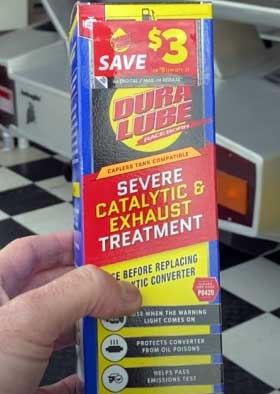
Dura Lube Catalytic Converter Cleaner is designed to remove carbon buildup, protect the catalytic converter, and reduce emissions.
Dura Lube promotes itself as a versatile cleaner that’s compatible with both gasoline and diesel engines, while CRC is more focused on gasoline engines (although it supports GDI and turbocharged engines).
Dura Lube’s main advantage is its ability to address a wider range of engine types, making it suitable for drivers with multiple vehicle types or who want an all-around cleaner.
In terms of performance, Dura Lube is effective in clearing out fuel system residues, though some users find it requires multiple treatments to see noticeable improvements.
This can make it pricier in the long run if you need to reapply frequently.
CRC, on the other hand, is often more effective with a single application, and its guaranteed-to-pass feature is a major plus for those primarily concerned with passing emissions tests. Dura Lube might be better for preventative maintenance, but if you need immediate emissions results, CRC is a more targeted choice.
Frequently Asked Questions (FAQ)
While CRC Emissions System Cleaner is effective at reducing emissions and can help with a P0420 code temporarily, it’s not a guaranteed or permanent fix specifically for P0420. However, CRC does offer a “guaranteed to pass” promise for emissions tests in general, and many users report success.
CRC Emissions System Cleaner is a fuel additive designed to clean the fuel system, reduce emissions, improve engine performance, and help vehicles pass emissions tests. It works by breaking down carbon deposits and residues within the fuel injectors, combustion chambers, and catalytic converter.
Yes, emissions system cleaners like CRC can work effectively, especially for mild to moderate emissions issues. They help to clear out deposits and improve fuel efficiency, potentially making it easier for vehicles to pass emissions tests. However, they are not a substitute for significant engine repairs.
Using CRC is easy. Just pour a bottle into a full gas tank, drive according to the instructions, and allow the product to circulate throughout the fuel system. The goal is to ensure the cleaner reaches all components of the fuel system to effectively reduce emissions and clear out any accumulated deposits.
Wrapping Up
If you’re facing an emissions test and unsure whether your car will pass, CRC Emissions System Cleaner is worth considering. With its easy application, promise to pass the test, and fuel economy boost, it’s a reliable option for many.
Keep a bottle handy for those pre-inspection nerves—it might just be the secret weapon your car needs!

